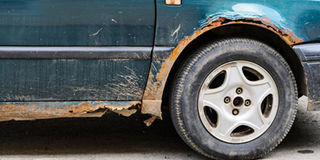How rust can damage your car

What you need to know:
- Cars, according to Issa Kibonge, a spray and paint dealer in Namuwongo, come with a specific level of rust protection with the commonest being body paint.
- Modern car technology has afforded manufacturers the luxury to fit trailblasing electronic systems ranging from anything to brakes and window controls, which, however, according to Amon Magezi, a car dealer in Nankulabye, are susceptible to rust and corrosion because of their metallic composition and proximity to metal components in the car.
Also referred to as oxidisation, rust happens when water and air come into contact and react with uncovered metallic surfaces.
Rust works well with water and can be worse in salty areas because salt hastens the chemical process that leads to rusting.
Of course rust presents serious problems to your car as highlighted below.
Outside body damage
Cars, according to Issa Kibonge, a spray and paint dealer in Namuwongo, come with a specific level of rust protection with the commonest being body paint.
This, he says, protects the metallic component of the car from coming into contact with air and water, which are the key ingredients of rust.
“The paint is made in a way that water will not stick onto the body of the car. It just slides off,” he says.
When a car’s paintwork is damaged from scratches, tree sap and acidic animal wastes, the metal gets exposed which in effect kick starts the rusting process.
Minor rust spots can be managed quickly. However, if it is disregarded it can gradually eat into the metal peeling away parts of the paint.
Damage to electronic systems
Modern car technology has afforded manufacturers the luxury to fit trailblasing electronic systems ranging from anything to brakes and window controls, which, however, according to Amon Magezi, a car dealer in Nankulabye, are susceptible to rust and corrosion because of their metallic composition and proximity to metal components in the car.
Damage to such components are quite dangerous and have the potential to disrupt the car’s entire electronic system.
Engine damage
A good number of vehicles nowadays have water drains and channels fitted.
These stop water from coming into contact with parts of the vehicle such as the engine that are susceptible to rust.
However, Magezi says, the drains and channels might get clogged, causing water to spill into the engine, which might lead to rusting.
Rust can eat away the metallic part of the engine compartment as well as weakening the exhaust system, and damaging the trunk region.
Car floor
Everyone loves a clean and freshly smelling cars. But have you ever cared to know what an improper car floor wash can lead to?
Washing a car, including the floor areas, is quite good but if it fails to fully dry before putting back the car mats, you might be aiding rust.
“The dampness reacts with air thus causing rust which subsequently eats up the car floor,” says Ali Mutawe, a washing bay attendant in Ntinda, Kampala.
Therefore, he says, it is advisable that you ensure that the car floor is fully dried up before using the car again.
Underside
Most cars are fitted with a sheet-like plate or coating to protect rust susceptible parts of the car.
However, the plates or the coating are not rust immune and are susceptible to tear and wear, which leaves the underside of the car exposed.
Cloggy soil mixed with water and other rough materials bombard the undercarriage, tearing away some parts of the car thus leading to oil, fuel and water leakages.
How to avoid rust on your car
According to Issa Kibonge, a car spray dealer in Namuwongo car rust most often occurs when water mixed with oxygen nestles its way into car parts that are susceptible to rust.
Rust can spread quickly causing irrevocable damage. Therefore, according to Kibonge the best way is to avoid or repair immediately as soon as you notice it.
Avoid puddles
While driving, especially on a rainy day be sure to avoid puddles. However, it is also dangerous to drive behind cultivator tracks as they might contain ingredients such as salt which aid rusting.
Wash and wax
Rinse the entirety of your car as often as possible. Use soap and water to remove mud, debris, and salt particles. Don’t forget to rinse the undercarriage of your car thoroughly, as these exposed parts are more susceptible to rusting.
Inspect
Routinely inspect parts of your car for rust. Look in areas such as the door jamb and other parts where different body components meet. Inspect undercarriage components such as the muffler, exhaust, coil springs, and frame.




